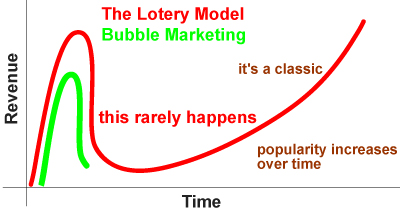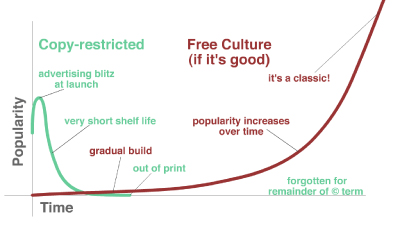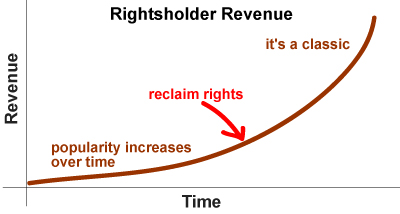Q: What happens when you put a lawyer, an economist, a business executive, a government bureaucrat and an artist into a locked room? A: The business executive assaults the economists, the lawyer sues the executive, the bureaucrat falls asleep, and the artist writes a song about it. This is the copyright debate.
Over the last couple of years, and as a background task, I have tried to make sense of the copyright / copy restriction debate. Is more or less copy restriction better or worse for rightsholders?
The debate, which requires multiple, advanced degrees and a slug of caffeine to follow, is often dominated by intellectual giants that toss around economic concepts such as ‘rivalrous resources’ and ‘marginal cost of production’. I have to admit, I still feel a little stupid when it comes to debating with the debaters. I am the person (the dreamer/entrepreneur) they didn’t let into the room to begin with.
So after two years of listening to all sides (and I am still listening), I have decided that today (October, 2009), I am not for loosening copyright restrictions.
The Lottery Model and Bubble Marketing
The graphic above depicts how the music industry operates today.
- Money is spent to launch an artist or song.
- A revenue / market traction bubble is created (depicted in green).
- More often than not, after the bubble-budget runs out, measurable market traction resembles pre-bubble spending.
- Breakeven on investment is occasionally achieved.
- And on rare occasions, a song or artist achieves post-bubble popularity over time (this would be a lottery hit).
Therefore, if one was concerned about the wellbeing of artists, and if he or she also happened to be a student of economics and intellectual property philosophy, I can see how this person would conclude (after looking at the current industry model) that less copyright restriction leads to more exposure, and thus profits, for artists.
The Free Culture ‘Model’
The graphic just above (source: www.questioncopyright.org) depicts the thinking behind the Free Culture model; it goes something like this: if restrictions are removed, content flows freely between humans, and then (song/artist) popularity (and thus profits) increase over time (see the maroon line). Alternatively (to the free culture model), content gets ‘locked up’ after the marketing/launch blitz in copyright monopolies; thus preventing the content (books, songs, video, etc.) from ever achieving the market traction they deserve (depicted by the green line).
I think I get it. Nobody can (today) ‘control’ content; it wants to be ‘free’. Songs are not rivalrous resources and the marginal cost of production is zero. Nobody gets hurt except those that have a vested interest (for example: record labels and publishers) in copyright monopolies. And even these ‘vested interests’ could benefit if they adopted new business model. Do I have this right?
My objections to the Free Culture model are as follows:
Beyond the fact that there’s no shelf life on the Internet and digital goods don’t go out of print, once a country, state, organization or individual - legislatively, legally or individually (via Creative Commons), dials back (loosens restrictions on) copyrights, they cannot easily be reclaimed or dialed back. I have a problem with this. I could be missing something here, but I can’t lend support to a model/mindset that fails to contemplate a day when global copyright can be controlled (turned on and off) via the click of a mouse (Jeff Shattuck - Cheers).
Just because the business models of rightsholders have not kept pace with the realities of Internet culture, it does not mean we should be throwing the baby out with the bathwater. There is another way, and interestingly enough, I believe the industry is organically moving/evolving in this direction.

The Click Control Model
The Click Control business-copyright model is one in which rightsholders will (someday) simply and easily suspend and reclaim their copyrights. It makes sense to be able to temporarily and selectively suspend one’s copyrights to encourage adoption (including commercial usage), and then (via the click of a mouse) reclaim their suspended rights someplace along the way to becoming a classic; provided that is where the song is headed (why bother otherwise?).
As a practical matter, in world where people still love to physically control their music (as in downloading it to their hard drives), this vision / model would be nearly impossible to absolutely enforce (non-absolute versions are surely possible). However as we transition from an ownership model to a streaming model (and we are), point-and-click copyright control makes a lot more sense.
The Click Control Model is in touch with where the industry is going.
The business models of rightsholders are finally catching up with Internet culture. Not only are labels figuring out that there’s not enough ROI in the bubble/lottery model to keep it going, they are also embracing 360 deals which create an alignment of economic interests between artists and investors. In these deals, music can be set free (preferably for period) to encourage viral promotion of a song or an artist; then it’s in every stakeholder’s interest, once some optimal level of viral exposure has been obtained, to be able to fully reclaim some or all rights. There are other benefits, as this model more closely tracks the slow-build, organic growth curve that most products (there are exceptions) on the Internet have to follow.
As I said at the top of this post, I am for more (extended) copyright control, not less; provided that we can someday move to the click-control model I just covered. However as I stated prior, I am not for any sort of broad government-driven controls on file sharing, as I view this as a reduction rather than an extension of (artist/rightsholders) rights.
Note: Please don’t confuse my authoritative writing style with my willingness to adopt a different position on this subject. I readily admit that I may have even mixed up terms and concepts within this post. Discussion and debate is what I am after here…
about Bruce Warila